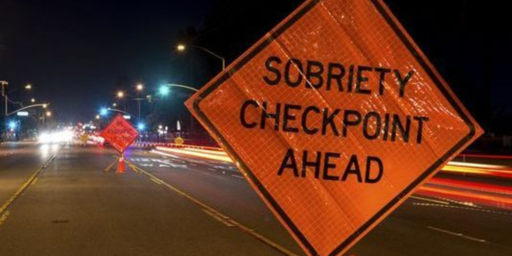Judge Rules Virginia’s DWI Law Unconstitutional
A judge in my county has ruled that Virginia’s drunk driving laws which, like most states’, operates under the presumption that defendants who have been tested above the legal limit for blood alcohol are guilty, violates the 5th Amendment of the U.S. Constitution (presumably, as applied via the 14th Amendment to the states).
Maverick N.Va. Judge Tosses Out DWI Cases That Presume Guilt (WaPo, A1)
A Fairfax County judge who believes Virginia’s drunken driving laws are unconstitutional has begun dismissing cases, including five DWI cases in a week, and has threatened to throw a veteran prosecutor in jail for arguing with him. Judge Ian M. O’Flaherty made it known in July that he felt Virginia’s DWI law unfairly deprived defendants of the presumption of innocence if breath tests showed that they had a blood alcohol content of .08 or higher, levels at which people are presumed to be intoxicated.
“We’ve been really racking our brains, trying to come up with some solution to it,” said Robert F. Horan Jr. (D), the county’s longtime chief prosecutor. “It’s a crazy situation. He is, for all practical and legal purposes, the Supreme Court of Virginia in these cases, even though, on the Supreme Court, it would take four of him” to issue a majority opinion invalidating a statute.
Critics say O’Flaherty, a General District Court judge, is endangering public safety by returning drunk drivers — some with alcohol levels of twice the legal limit — to the roads. But some legal experts are sympathetic, saying the judge might be making a valid argument and protecting the constitutional rights of all motorists.
The judge said in an interview that he recently was made aware of a 1985 U.S. Supreme Court ruling that reversed a Georgia murder conviction because the jury had been told to presume that, if the suspect was “of sound mind,” he had the intent to kill. As it does in all states and the District, Virginia’s drunken driving law states that, for anyone with a .08 or higher reading on a breath test, “it shall be presumed that the accused was under the influence of alcohol intoxicants at the time of the alleged offense.”
Prosecutors point out that Virginia’s law creates a “rebuttable presumption,” meaning the defendant has the opportunity to prove it wrong. But O’Flaherty said that wrongly shifts the burden of proof from the prosecution to the defense. “The Fifth Amendment,” said O’Flaherty, 59, “is an absolute protection against requiring the defendant to say or do anything in the course of a trial. . . . The Fifth Amendment means the defendant can sit there, not say or do anything, and at the end of the case say, ‘Can I go home now?’ ”
No other judge in Fairfax — or elsewhere in Virginia, as far as can be determined — has joined O’Flaherty. But the judge said some other jurists have told him they agree with him. “I had one judge tell me, ‘I’d rule that way, but I don’t have the guts to,’ ” O’Flaherty said. “I told him, ‘You should be driving a truck.’ “
O’Flaherty makes an interesting argument. All traffic laws essentially operate this way, though. If one gets a speeding ticket, for example, it is merely a case of a government employee, operating under pressure of meeting revenue quotas, charging that the defendant did it. The burden of proof is on the defendant to demonstrate that he is not guilty.






Hurray to Judge O’Flaherty. First the stupid DC law, now it’s Fairfax’s turn. I’m not supporting the right to DWI, but we should have the same burden of proof on the State in these cases as in all other criminal cases.
DC Loser:
Right on.
I just wonder when the American prople are giong to get smart and realize that drunk driving laws are mostly an additional tax on the people. The lawyers don’t want any changes either, they are making a fortune. That Virgania judge should get a medel for heroism by perserving our constitutional rights.
Speeding tickets, like many other motor vehicle infractions, are a civil offense and have a different burden of proof. I believe Judge O’Flaherty’s ruling is correct, as far as it applies to criminal charges. But under our civil law, Virginia could still automatically suspend the license of any driver testing over 0.8%.
The reality in any prosecution is, if you don’t mount a defense and succeed in raising a reasonable doubt in the minds of the jurors, you get convicted unless the prosecution has totally screwed up its own case.
That’s not the same as a presumption of guilt. And relying on the prosecution to screw up isn’t exactly a wise strategy.
IANAL, but from what little I do know, this sounds like a conflict of constitutional interests – specifically, the accused’s right to a presumption of innocence vs. the general public’s right to be secure in person & property. Sure, a specific BAC # might not be iron-clad, beyond-a-shadow-of-a-doubt evidence of impairment in a particular individual, but it’s a pretty good indicator. The question is – is the uncertainty large enough to keep the guy free, and potentially endanger anyone he might run into, or is it small enough that the imposition on the accused’s rights is acceptable?
The public’s right to be secure in person and property as a constitutional protection means secure from governmental intrusion. Forcing drivers to blow into Breathalyzers or forfeit rights is the real violation. For years DMV’s across the nation have been falsely telling us driving is a “privilege” not a “right”. What a bunch of hooey. We all have a right to get to work, go to the store and pick up our kids by using our autos. The idea government grants us that right as a privilege is nonsense.
Judges have forsaken being true judges and have become instruments of public policy. They often do what the think is good for society rather than what is good for the individual and the law. Maybe more of them should be driving trucks.
Steven: I can’t disagree. SCOTUS has construed the right against self-incrimination incredibly narrowly, unfortunately.
The problem is that we have created this bizarre concept in the law of “privilege” versus “right” and put driving in the former category.
Lest we forget, the leading cause of death for Americans between the ages of 1 and 35 is motor vehicle collisions. Indeed, the biggest killer of our children is the American driver. Where this a medical disease, quarantine would trump any “right” you thought you had to “get to work, go to the store and pick up our kids…” etc. Alas it is not a medical disease but a cultural sickness — in short, a mass brainwashing that “what’s good for General Motors” is good, period.
Because about 3,000 died on 9/11 we have gone to war twice. But more than 40,000 die every year on our highways, and we bitch about our right to disregard speed limits and/or drive drunk.
Even when sober, few Americans care to observe or even be knowledgable of the simplest rules of the road and safety regulations. For instance, if it’s raining so you switch on the wipers, what else does the law require? Next rainstorm, count the number of drivers with wipers on and headlights off. They are all in violation, and most – I venture to say – oblivious to the requirement.
Americans worship a molten idol, their automobile, as Providence. Historians of the future will look back on this as our style of human sacrifice to a mythical god of prosperity.
Which would you give up first: your right to freedom of religion or your car keys?
See what I mean?
There is little anyone can do about it, even if one cared. My condolences, in advance, to readers who will mourn the loss of loved ones to a motor vehicle collision. The world will little note nor long remember your grief over a death so utterly vain.
Hey Herb, As I’m not a constitutional lawyer, just WHERE in it does it contain the right to Drive? A tax, get real,wait till one of these “HIGHWAY TERRORISTS” kill or cripple one of your loved one’s,what be your word’s then?